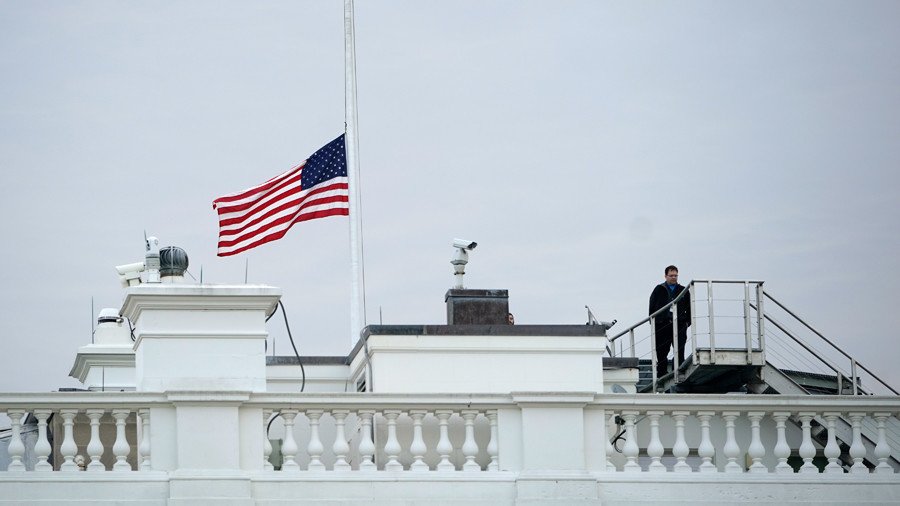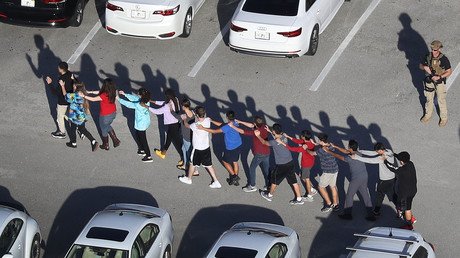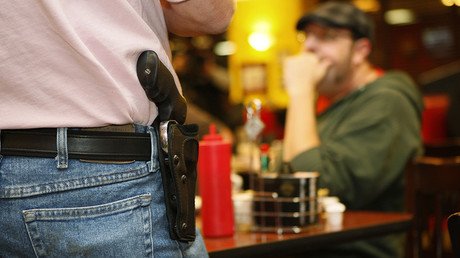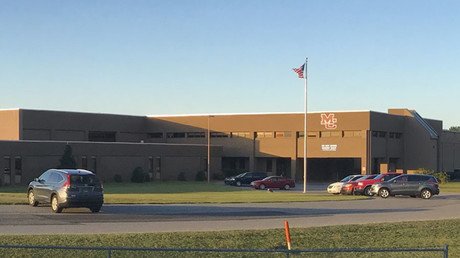How many Americans must die before shooting sprees finally end?

Once again, America is grappling with the horror of yet another mass shooting. And once again, the tragedy will trigger a heated political debate between Democrats and Republicans on the question of gun control.
Of all the tragedies that people must occasionally face, the prospect of being helplessly trapped inside of a building with a heavily armed killer on the prowl must rank as one of the worst. Add to the image innocent schoolchildren and you have an absolute nightmare.
That was the scenario visited upon hundreds of students and faculty at Marjory Stoneman Douglas High School in Parkland, Florida on Wednesday as Nikolas Cruz, 19, went on a shooting spree, killing 17 people. The massacre has entered the annals as one of the deadliest mass shootings in US history.
The attack marks the eighth school shooting to result in injury or death so far this year, and the 18th incident involving gunfire in schools.
As the tragedy was unfolding in Parkland, which just days earlier had taken 15th place in The Safest Cities Survey, Congress was obsessing over the question, once again, how such an outrage could happen in America.
ROTC student used Kevlar sheets to shield students from gunfire https://t.co/LG6SBgfKLP via @nypostpic.twitter.com/nsRWX2GQ88
— Chris 🇺🇸 (@Chris_1791) February 15, 2018
“This happens nowhere else other than the United States of America, this epidemic of mass slaughter, this scourge of school shooting after school shooting," said Chris Murphy, a Democratic senator from the state of Connecticut. "It only happens here not because of coincidence, not because of bad luck, but as a consequence of our inaction. We are responsible.”
We have to elect candidates that are not funded by the NRA in November. We have an opportunity to elect candidates who won’t allow kids to go to school and get shot. It is disgusting how many times this has happened and Republicans do nothing. You all have blood on your hands.
— Chelsea Handler (@chelseahandler) February 14, 2018
For those unfamiliar with the great American gun debate, it can be roughly summed up as follows. On the right is the Republican Party, ardent defender of the Second Amendment, which unequivocally states: “A well regulated Militia, being necessary to the security of a free State, the right of the people to keep and bear Arms, shall not be infringed.”
The Republicans are also heavily supported by the National Rifle Association (NRA), which ranks as one of the most powerful lobbying groups in Washington, DC.
The Republican and NRA response to such tragedies is to call for more security measures, as opposed to government interference. Tennessee, for example, recently passed a bill that requires cities and counties to employ security guards, install metal detectors, and check bags at many public places. It even allows handgun permit holders to carry their weapons.
Members of the Republican Party and the NRA are extremely opposed to any legislation that would impose restrictions on gun users. However, exceptions to the rule, like four-leaf clovers, do happen. For example, following the October 1, 2017 Las Vegas shooting, which left 58 concertgoers dead and many hundreds injured, the NRA called for"additional regulations" on so-called bump stocks, a device that allows semi-automatic rifles to operate like fully-automatic rifles.
The Democrats, meanwhile, hold varying degrees of opinion with regards to guns, although it seems the majority would like to see them limited to duck hunting than a method of personal protection. Others call for an outright retraction of the Second Amendment altogether, while still others demand strict government control and oversight over gun ownership.
Yet the one question that is heard from both sides of the political spectrum following every shooting massacre is: How did the authorities let this happen? How was it possible for an individual with mental problems to walk into a store and purchase a powerful weapon? After all, Nikolas Cruz had some serious issues.
Mass shooting in #Florida school:- 17 dead- shooter identified as 19yo former student Nikolas Cruz- he had been banned from campus for making threats in the past- more details: https://t.co/YTOp0lmwjr#Parklandpic.twitter.com/vDY5RyLuJO
— RT (@RT_com) February 15, 2018
According to an article in the Washington Post, Cruz “had been getting treatment at a mental health clinic, but he had stopped. He had been expelled from school for disciplinary problems… His father died a few years ago, and his mother, among the only people with whom he was close, died around Thanksgiving.”
To top it off, the FBI was reportedly warned last year about Cruz following a threat he had posted on YouTube about becoming “a professional school shooter."
So again the question: how was it possible that Cruz came to own a powerful firearm? The quick answer is that if a person can pass a background criminal check, he or she can qualify to buy the weapon of their choice – same day. Presently, there is no law that requires a background check on the mental condition of a person before purchasing a firearm.
In fact, Trump and Congress - with impeccable timing - just blocked an Obama-era piece of regulation that required the Social Security Administration to disclose information about individuals who are receiving disability benefits due to mental illness and are desirous of owning a firearm. The NRA and American Civil Liberties Union (ACLU) argued that the rule violated the Second Amendment rights of individuals with mental illness without due process.
This brings up another aspect of the gun control debate, which is the opioid epidemic. The issue of American citizens getting hooked on powerful painkillers has become so serious that funding for it was included in Trump’s 2019 budget plan. And here is the grim irony of the story: drug overdoses now kill more Americans than guns.
Indeed, the United States saw its murder rate increase in 2015, 2016 and the first half of 2017. At the same time, an opioid epidemic has led to nearly 64,000 drug overdose deaths in 2016 (the majority due to opioids). This figure is up more than 20 percent from approximately 52,000 drug overdose deaths in 2015.
No surprise that some experts are starting to suggest a direct link between the surge in psychotropic drug abuse and the rise in murders. Stephen Paddock, for example, the gunman in the Las Vegas massacre, was prescribed an anti-anxiety drug diazepam that has been shown to lead to aggressive behavior, the Las Vegas Review-Journal reported.
Whether or not the gunman in the Florida school shooting was also prescribed some sort of painkiller that may have contributed to his state of mind remains to be seen. But the fact that he was dealing with deep depression and other mental illnesses suggests he may have been.
Finally, there is a temptation among the Democrats to beef up gun laws in the belief this will automatically lead to a drop in random shooting deaths. Not only are there no facts to support this assertion, it seems exactly the opposite is true.
For example, in Chicago, which has some of the strictest gun laws in the United States, gun-related crimes are actually soaring.
Florida school shooting suspect Nikolas Cruz arrives at Broward County jail (VIDEO) https://t.co/T7Df5ofpRQ#Parklandpic.twitter.com/Vyz61okhoq
— RT (@RT_com) February 15, 2018
“I think if you look to Chicago, where you had over 4,000 victims of gun-related crimes last year, they have the strictest gun laws in the country,” White House press secretary Sarah Huckabee Sanders told reporters following the Vegas shooting. “That certainly hasn’t helped there.”
Republicans have a popular expression that “once you outlaw guns, only the outlaws will have guns.” Although there is some truth in that folksy wisdom, the real truth seems to lie somewhere in the middle.
The gun genie was let out of the bottle at the time of America's founding, and – short of an epic crackdown on gun rights and changes to the Constitution – there seems to be no way of putting it back.
Now Americans need to find a way for allowing the Second Amendment to flourish, as it was designed, without innocent people getting gunned down indiscriminately by individuals who lack the mental frame of mind to own a gun. After all, it is not impossible to imagine the left eventually acquiring the critical mass it would need to subvert the Constitution if the bloodshed does not end.
The statements, views and opinions expressed in this column are solely those of the author and do not necessarily represent those of RT.
















